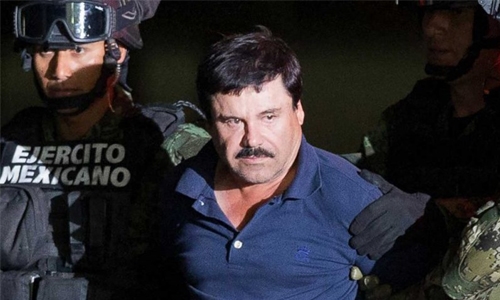El Chapo puts the drug war on trial
An iconic photo from 1993 shows Colombian police officers smiling as they crouch over the bullet-ridden corpse of Pablo Escobar, who Forbes magazine had claimed was the richest drug trafficker on the planet. The picture was taken by Steve Murphy, an agent for the Drug Enforcement Administration, who helped track down the kingpin accused of fomenting mass murder in his homeland. Escobar’s “fate should serve as an example to others who traffic in death and misery,” said the drug czar Lee Brown, amid celebrations in Bogotá and Washington.
Fast forward 25 years, and a new supervillain, Joaquin Guzman, known as El Chapo, sits in a federal court in Brooklyn, accused of trafficking $14 billion worth of heroin, cocaine, marijuana and crystal meth to Americans over two and a half decades. Guzman’s infamy, including escaping from two maximum-security prisons in Mexico, puts him alongside Escobar and indeed the bootlegger Al Capone as the most notorious traffickers of modern times. In the years between Escobar’s death and Guzman’s trial, which began this week, the war on drugs has stumbled on. In terms of taking down kingpins and burning heaps of their narcotics, it has been a stunning success.
In terms of reducing the number of Americans killed from overdoses or Latin Americans murdered over smuggling profits, it has been a resounding failure. The Drug Policy Alliance estimates the fight against the illegal drug trade costs United States taxpayers $58 billion a year. But 2017 claimed a record 15,900 heroin overdose deaths, as well as highs in fatalities from cocaine, meth and fentanyl. In Mexico, the many-sided battle between rival drug cartels and an array of security forces is estimated to have killed more than 119,000 people over a decade. That’s comparable to some of the worst continuing armed conflicts around the world and has destabilised swaths of the country.
Most drug lords who are extradited to the United States cut deals. But Guzman pleaded not guilty, forcing prosecutors to put together a case scheduled to last months. They say they will call witnesses, including his fellow traffickers, to describe how he smuggled dope in ingenious ways — such as in cans of jalapeño chilies — bribed Mexican officials at every level and masterminded the brutal murder of his enemies. Eduardo Balarezo, one of Guzman’s defence lawyers, told me that he will challenge the witnesses and draw attention to any deals they may have made for their testimony, and that he will question the tactics of DEA agents. In the past, agents have been criticised for the use of dubious informants and embedding with drug traffickers.
The prosecutors may well prove that Guzman is guilty of heinous crimes. But they’re also likely to inadvertently highlight the decades of failure to stop either the flow of drugs or the bloodshed, as well as particular DEA tactics and the aid to Mexican security forces that suffer from corruption. As the world watches, it will be difficult not to wonder whether Guzman’s case is actually putting the war on drugs on trial. That is not to say that Guzman does not deserve to spend his life in prison if the jury finds him guilty.
Covering cartel violence in Mexico since 2001, I have stared at hundreds of bloody corpses and heard the anguish of too many of their loved ones, which brings home the immense human cost. And DEA agents risk their lives trying to stop this menace. But even if Guzman is sentenced to a maximum-security prison, it will not save families on both sides of the border from more drug overdoses and more drug violence. The victims deserve more. Working out a better drug policy is a tough challenge, but we have a historic opportunity. Just a decade ago, many observers said that any drug legalisation was a nonstarter.
But on Nov 6, Michigan became the 10th state to legalise recreational marijuana; Canada has legalised it and Mexico is taking steps in that direction. We may never want shops openly selling heroin. But in addition to legalisation of less dangerous drugs, a better effort could be made to get more addicts into rehab; a 2015 study found that almost 80 per cent of Americans with problematic opioid use were not getting treatment.
Methadone programmes can also help some addicts and stop them from funding mass murder south of the Rio Grande. A first step is simply to acknowledge that the current drug policy is failing. If it continues stumbling on, in another 25 years we’ll probably be focused on a new kingpin, along with more tales of drug money, police corruption and mountains of corpses.
Related Posts

